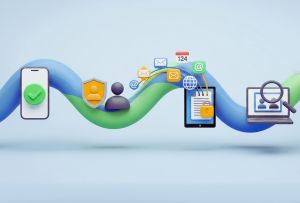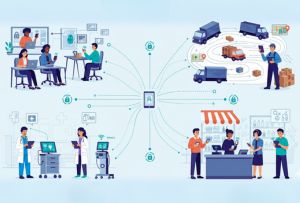At Experion Technologies, we help businesses embrace a mobile-first world with secure, scalable, and future-ready enterprise mobility management solutions that are designed around their unique needs.
The modern business ecosystem is rapidly shifting toward mobility. Today’s employees expect uninterrupted and seamless access to corporate resources across multiple devices, regardless of location or time. This growing reliance on mobile technologies is reshaping the way organizations operate, communicate, and deliver value.
However, this transformation goes far beyond simply enabling connectivity. It requires strong and intelligent management frameworks that safeguard sensitive data, ensure regulatory compliance, and maintain consistent productivity across a distributed workforce. This is where Enterprise Mobility Management (EMM) becomes critical. By providing centralized control and security for devices, applications, and content, EMM empowers organizations to unlock the true potential of mobility while protecting the enterprise from emerging digital risks.
Empower your workforce with mobility that is secure, scalable, and smart.
Schedule a consultation
What are Enterprise Mobility Management Solutions?

Enterprise Mobility Management solutions encompass a comprehensive set of technologies, policies, and processes that allow organizations to securely oversee and optimize the use of mobile devices, applications, and corporate data. The growing adoption of smartphones, tablets, and other portable devices in the workplace has made it critical for businesses to establish a structured approach to mobility. At its core, EMM ensures that enterprises can fully embrace mobility while maintaining strong safeguards for sensitive information and ensuring compliance with regulatory and industry standards. It provides the framework that balances employee flexibility with organizational security, enabling businesses to operate efficiently in a mobile-first world.
Core Components of Enterprise Mobility Management Solutions
To achieve these objectives, EMM integrates several essential components:
- Mobile Device Management (MDM): Provides the ability to enroll, secure, and monitor enterprise-owned or employee-owned devices used for work purposes.
- Mobile Application Management (MAM): Governs the access, distribution, and usage of business applications, ensuring that only approved apps can interact with enterprise systems.
- Mobile Content Management (MCM): Safeguards corporate documents and data by controlling how files are accessed, shared, and stored across mobile environments.
- Identity and Access Management (IAM): Ensures that only authorized users gain access to corporate networks and resources through secure authentication and identity verification protocols.
Together, these components form a layered approach that protects enterprise mobility from potential threats while supporting seamless user experiences.
Enterprise Mobility Management vs. Unified Endpoint Management
Although enterprise mobile management solutions provide robust oversight of mobile devices and applications, they represent only one part of the broader endpoint security picture. Unified Endpoint Management (UEM) expands on this foundation by integrating management across all types of endpoints, including desktops, laptops, Internet of Things (IoT) devices, and even wearables. This convergence creates a single, centralized ecosystem where IT teams can oversee every endpoint from one platform. The distinction lies in scope: EMM specializes in mobility, while UEM provides a more holistic view of all enterprise endpoints. For organizations looking to future-proof their IT strategies, EMM often serves as a stepping stone toward the broader adoption of UEM.
The Growing Importance of Enterprise Mobility Solutions
The adoption of enterprise mobility solution has moved from being an option to becoming a necessity for organizations that want to remain competitive and resilient. As enterprises transition into a mobile-first environment, the ability to manage devices, applications, and data securely has become a core business requirement rather than a supplementary capability.
- Security Challenges: The rapid rise of mobile technology has opened new avenues for cyber threats, data breaches, and unauthorized access. Every mobile device connected to corporate networks introduces potential risks. Enterprise Mobility Management (EMM) plays an essential role in mitigating these vulnerabilities by enforcing strict security policies, encrypting sensitive data, and equipping IT teams with monitoring and remediation tools that ensure threats can be detected and addressed before they cause damage.
- Business Continuity: Continuity of operations has become critical in a world where disruptions can occur suddenly and at scale. From global crises to localized outages, organizations need systems that support uninterrupted workflows. EMM enables secure remote work capabilities, giving employees safe access to enterprise systems from anywhere, at any time. This resilience ensures that businesses remain operational and productive even under challenging circumstances.
- Workforce Flexibility: Modern employees expect flexibility in how and where they work. They want the freedom to use devices they are comfortable with, without compromising security or performance. Enterprise mobile solutions make this possible by ensuring that essential productivity tools and corporate resources are available securely across various devices and platforms. This flexibility not only enhances employee satisfaction and engagement but also strengthens an organization’s ability to attract and retain top talent in a highly competitive market.
In essence, the growing reliance on mobility makes EMM a cornerstone of business strategy. It bridges the critical gap between flexibility and security, empowering enterprises to thrive in a digital-first, mobile-centric world.
Core Features of Enterprise Mobility Management Solutions
 Enterprise Mobility Management solutions are built on a set of features that together create a secure, centralized, and highly efficient mobile ecosystem for organizations. These features ensure that every device, application, and interaction within the enterprise environment is managed with precision, control, and confidence.
Enterprise Mobility Management solutions are built on a set of features that together create a secure, centralized, and highly efficient mobile ecosystem for organizations. These features ensure that every device, application, and interaction within the enterprise environment is managed with precision, control, and confidence.
- Device Enrollment and Provisioning: Onboarding new devices quickly and securely is one of the most important aspects of mobility. Whether devices are company-owned or part of a bring-your-own-device (BYOD) framework, automated provisioning ensures that each device is registered, configured, and compliant with corporate security requirements from the moment it is activated.
- Secure Access and Identity Verification: Ensuring that only authorized users gain access to sensitive applications and networks is essential for protecting enterprise assets. EMM solutions provide secure login mechanisms such as multi-factor authentication and single sign-on, combined with identity verification processes that reduce the risk of unauthorized access.
- App Distribution and Updates: Business applications are central to productivity, but they must be managed carefully to prevent security gaps. With EMM, enterprises can distribute approved apps directly to employee devices, manage version updates centrally, and prevent the use of unauthorized or outdated applications. This guarantees consistency across the workforce and reduces risks associated with shadow IT.
- Policy Enforcement and Compliance Tracking: Regulatory compliance is a constant concern for enterprises across industries. EMM allows organizations to define clear usage policies and enforce them across all connected devices. Compliance tracking ensures that every device adheres to internal standards as well as external regulations, helping organizations avoid penalties and maintain a trustworthy reputation.
- Remote Monitoring, Support, and Troubleshooting: Mobility introduces the challenge of managing devices and users that are distributed across geographies. EMM addresses this by providing IT administrators with real-time visibility into devices and applications. Issues can be diagnosed remotely, and support can be delivered instantly without requiring physical access to the device. This reduces downtime, improves response times, and ensures smooth business operations.
At Experion Technologies, we bring these capabilities together through our enterprise mobile device management solutions. By integrating security, compliance, and usability into a unified framework, we enable enterprises to confidently manage their mobile ecosystems while giving employees the flexibility to work efficiently and securely in any environment.
“From devices to data, we make enterprise mobility effortless and secure.”
Get started with Experion
Key Benefits of Enterprise Mobile Solutions
Adopting enterprise mobile solutions provides organizations with a wide range of advantages that go beyond basic device management. These benefits strengthen security, simplify IT operations, and enhance overall business performance.
- Enhanced Security and Compliance: Enterprise mobile management solutions help protect sensitive business data by enforcing strict security protocols such as encryption, authentication, and remote wipe capabilities. They also support compliance with industry regulations, ensuring that organizations meet legal and contractual obligations without exposing themselves to risk.
- Centralized Management: By consolidating the oversight of devices, applications, and content into a single platform, enterprises can eliminate complexity and gain greater visibility across their mobile ecosystems. This centralization makes it easier for IT teams to monitor devices, deploy updates, and enforce policies consistently across the organization.
- Improved Productivity and Collaboration: Enterprise mobility solutions empower employees with secure access to business applications and resources anytime and anywhere. This flexibility allows teams to collaborate more effectively, respond quickly to business needs, and maintain high productivity levels whether they are in the office, working remotely, or on the move.
- Cost Optimization and IT Efficiency: Streamlined mobility frameworks reduce IT overhead by automating routine tasks such as device enrollment, app distribution, and policy enforcement. This not only lowers operational costs but also frees up IT resources to focus on more strategic initiatives, improving the overall efficiency of the organization.
In essence, enterprise mobile solutions enable businesses to achieve a balance between security, flexibility, and cost-effectiveness, creating a strong foundation for long-term digital success.
Challenges in Implementing Enterprise Mobility Solutions
While enterprise mobility solutions provide significant value, organizations often encounter challenges during implementation that need careful planning and execution.
- Data Privacy and Regulatory Compliance: Protecting sensitive data while adhering to strict regulatory frameworks is one of the most significant hurdles. Businesses must ensure that mobility strategies comply with industry-specific standards such as HIPAA, GDPR, or PCI-DSS, while still allowing employees the freedom to use mobile devices effectively.
- Integration with Legacy IT Systems: Many organizations rely on older systems that were not originally designed for mobile compatibility. Integrating enterprise mobility management with these legacy platforms can be complex, requiring custom solutions and careful planning to avoid disruptions.
- Balancing Convenience with Corporate Security: Employees expect a seamless and user-friendly experience when accessing corporate resources on their devices. However, IT teams must enforce strong security measures to protect the organization. Striking the right balance between usability and security is an ongoing challenge for businesses.
- High Upfront Investment vs. Long-Term ROI: Implementing enterprise mobile management solutions often requires significant initial investment in infrastructure, licenses, and training. Organizations must weigh these costs against the long-term benefits of improved efficiency, security, and productivity to justify the investment.
Enterprise Mobile Solutions for Different Industries

The value of enterprise mobile solutions extends across industries, offering tailored benefits depending on specific operational needs and regulatory environments.
- Healthcare: Enterprise mobile device management solutions ensure secure access to patient records and clinical applications, maintaining HIPAA compliance and enabling healthcare professionals to deliver faster, more accurate care.
- Finance: In a highly regulated industry, mobility solutions help financial institutions enforce strict compliance with standards such as PCI-DSS and SOX. They also protect against fraud and unauthorized access by strengthening identity and data security measures.
- Retail: Enterprise mobility enables mobile point-of-sale systems, inventory management, and real-time workforce communication. Retailers can empower staff to serve customers more efficiently while improving operational visibility across multiple locations.
- Manufacturing: Mobility solutions support connected operations by integrating with IoT devices, enabling real-time monitoring of equipment, and enhancing workforce collaboration on the shop floor. This leads to greater efficiency, predictive maintenance, and smarter decision-making.
Across these industries, enterprise mobility not only strengthens security but also drives innovation and operational efficiency, making it a transformative force in the digital era.
Best Practices for Successful Enterprise Mobility Management Implementation
Implementing enterprise mobility management solutions requires a thoughtful approach that balances security, usability, and scalability. Organizations that follow proven best practices are better positioned to maximize the value of their mobility investments.
- Define Clear Security and Mobility Policies: A strong framework begins with well-defined policies that outline how devices, applications, and data should be used. Clear guidelines help minimize risks, ensure compliance, and provide employees with a consistent understanding of their responsibilities.
- Train Employees for Responsible Device and App Usage: Even the most advanced solutions can be compromised if users are not adequately trained. Providing regular training sessions and awareness programs helps employees adopt secure practices, avoid risky behaviors, and make the most of mobility tools.
- Build Scalable Solutions That Evolve with Business Needs: Mobility requirements change as organizations grow. Solutions should be designed with scalability in mind, allowing enterprises to expand seamlessly, integrate new technologies, and adapt to evolving industry trends without major disruptions.
- Choose the Right Technology Partner for Industry-Specific Needs: Not all businesses face the same mobility challenges. Partnering with a provider that understands the unique demands of your industry ensures that solutions are customized for maximum impact, compliance, and long-term success.
Top Use Cases of Enterprise Mobile Solutions
 At Experion Technologies, we have partnered with global enterprises to implement enterprise mobile solutions that address real-world challenges and deliver measurable outcomes. Some of the most impactful use cases include:
At Experion Technologies, we have partnered with global enterprises to implement enterprise mobile solutions that address real-world challenges and deliver measurable outcomes. Some of the most impactful use cases include:
- Secure Remote Workforce Management: Enabling employees to access business applications and data safely from anywhere while maintaining full compliance with corporate policies.
- Field Service Mobility and Logistics: Empowering field teams with real-time data, task updates, and collaboration tools to improve efficiency and customer satisfaction.
- Retail Mobility and Point-of-Sale Enablement: Streamlining store operations with mobile PoS systems, inventory management, and customer engagement tools that enhance the shopping experience.
- Healthcare Device Usage with HIPAA Compliance: Ensuring that healthcare professionals can securely access patient records and medical applications while adhering to strict regulatory requirements.
- Financial Services Mobility with Fraud Prevention and Secure Access: Providing banking and financial institutions with secure mobile platforms that reduce fraud risks, safeguard sensitive data, and improve client trust.
Through these use cases, Experion demonstrates how tailored enterprise mobility management solutions can create business value, drive innovation, and enable organizations to operate with agility in a mobile-first world.
Case Study: Transforming Healthcare with Enterprise Mobile Solutions
A leading healthcare provider in Australia faced significant challenges with their outdated legacy systems. The organization relied on multiple disconnected applications and paper-based workflows, which made it difficult to maintain efficiency, ensure compliance, and provide seamless patient care. Their existing platform was struggling to keep pace with modern healthcare demands, regulatory updates, and the growing need for digital-first patient engagement.
To address these challenges, Experion partnered with the client to rebuild the entire system from the ground up. Our team developed a highly modular, scalable, and web-based platform designed to replace legacy applications while ensuring compliance with NSQHS standards, Medicare guidelines, and federal healthcare regulations.
The solution was engineered with FHIR interoperability, enabling smooth integration with hospital Electronic Health Records (EHRs) and Personal Health Records (PHRs). It incorporated features such as:
- Discharge summary management to improve care continuity.
- Referral workflows that connected multiple healthcare providers.
- Secure messaging capabilities to safeguard communication.
- Allied health modules for specialized care coordination.
From a patient perspective, the platform provided secure and convenient access to their personal health information. This empowered individuals to take an active role in their healthcare journey, while providers benefited from faster, more accurate data exchange and reduced administrative burden.
The results were transformative. The new solution streamlined workflows, improved regulatory compliance, and enhanced interoperability across healthcare systems. Most importantly, it achieved an 86 percent reduction in claim processing time, creating measurable value for both the healthcare provider and their patients.
This case study highlights how Experion’s enterprise mobile device management solutions can modernize critical systems, enhance patient care, and deliver compliance-ready mobility in highly regulated industries such as healthcare.
Your enterprise is mobile. Is it secure? Let Experion show you how.
Explore solutions now
Future of Enterprise Mobility Management Solutions

The future of enterprise mobility management solutions is being shaped by rapid technological advancements and evolving business needs. Organizations that embrace these trends will be better prepared to secure their mobile ecosystems while unlocking new opportunities for innovation and growth.
- AI and Machine Learning in Predictive Security: Artificial intelligence and machine learning are revolutionizing enterprise security by enabling predictive analytics. Instead of reacting to threats after they occur, businesses can proactively detect suspicious activities and neutralize risks before they escalate.
- 5G and IoT Integration: The rollout of 5G is accelerating connectivity speeds and enabling real-time communication across devices. When combined with the Internet of Things, enterprises can create smarter, more connected ecosystems that empower mobile workforces and open new possibilities in automation and data-driven decision-making.
- Cloud-Driven Strategies: Cloud platforms are redefining scalability and flexibility in enterprise mobility. By shifting to cloud-driven models, businesses can deploy, manage, and secure mobility solutions more efficiently while ensuring seamless access to applications and data across geographies.
- The Shift Toward Unified Endpoint Management (UEM): While enterprise mobility management focuses on mobile devices, the future lies in converging all endpoints under one platform. UEM provides centralized visibility and control over smartphones, tablets, laptops, desktops, wearables, and IoT devices, ensuring complete ecosystem management and simplifying IT operations.
Together, these innovations signal a future where mobility is not just a convenience but a core enabler of business resilience and competitiveness.
Conclusion
In today’s mobile-first business landscape, enterprise mobility management solutions have become fundamental to organizational growth, security, and workforce empowerment. Businesses that prioritize robust enterprise mobility frameworks are not only securing sensitive data but also preparing their workforce to operate with agility and confidence in a digital-first world.
By investing in enterprise mobile solutions, companies create an environment that fosters productivity, supports compliance, and encourages innovation. Looking ahead, future-ready organizations will leverage AI, cloud, 5G, and UEM to remain resilient in the face of emerging challenges and opportunities.
Key Takeaways
- Enterprise mobility management secures and optimizes mobile ecosystems by bringing devices, applications, and content under centralized control.
- Mobility drives workforce productivity, collaboration, and flexibility, supporting both remote and on-site operations.
- AI and machine learning will play a central role in predictive security, reducing risks before they impact business continuity.
- Cloud-based enterprise mobility strategies ensure scalability, agility, and cost efficiency.
- 5G and IoT integration will create smarter, faster, and more connected enterprise environments.
- The evolution toward Unified Endpoint Management will unify all devices and endpoints under one umbrella, simplifying IT oversight and strengthening security.
At Experion Technologies, we empower global businesses to future-proof their operations with enterprise mobility solutions that combine security, scalability, and innovation. Connect with us to discover how mobility can transform your enterprise into a truly digital-first organization.

